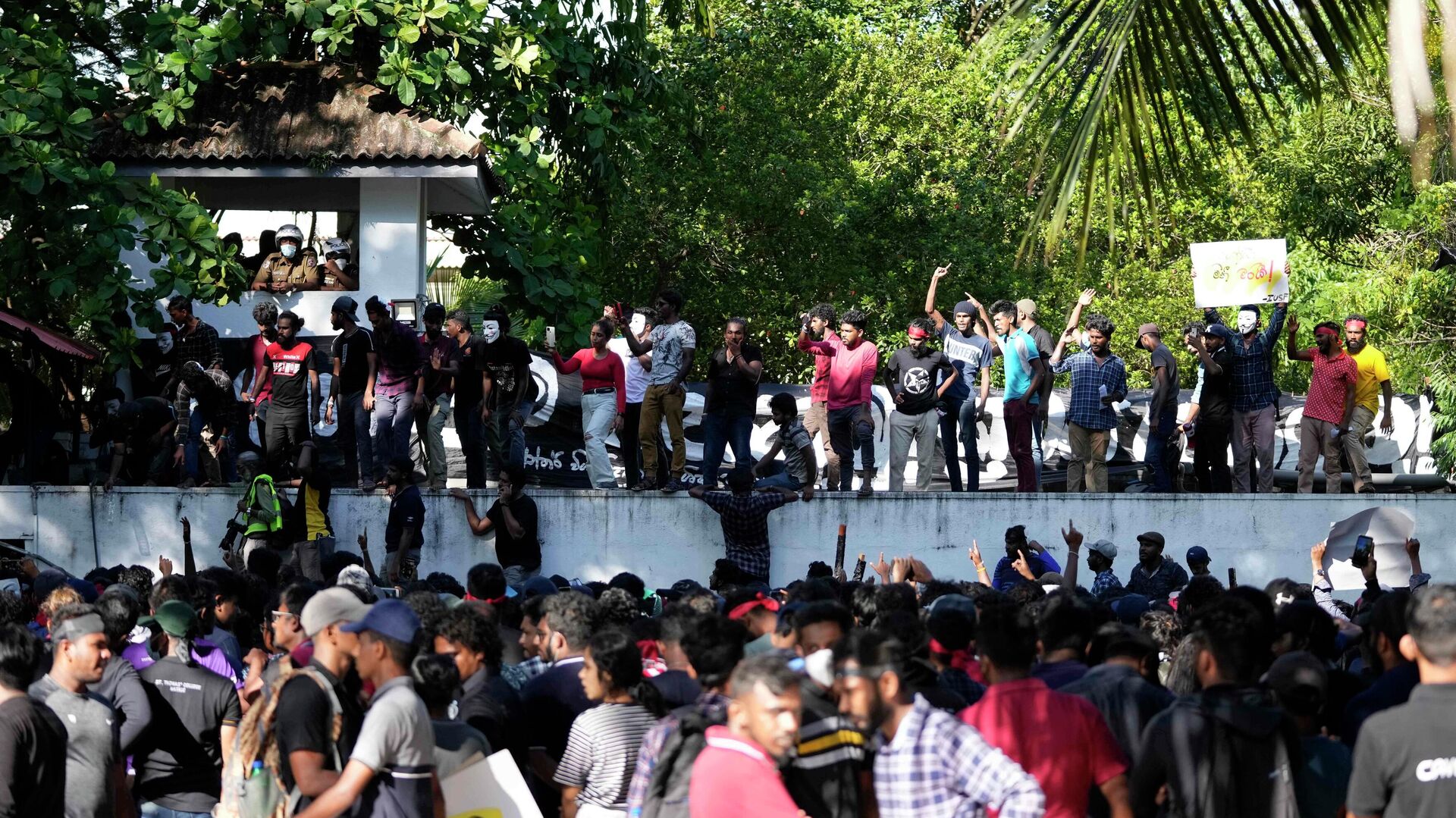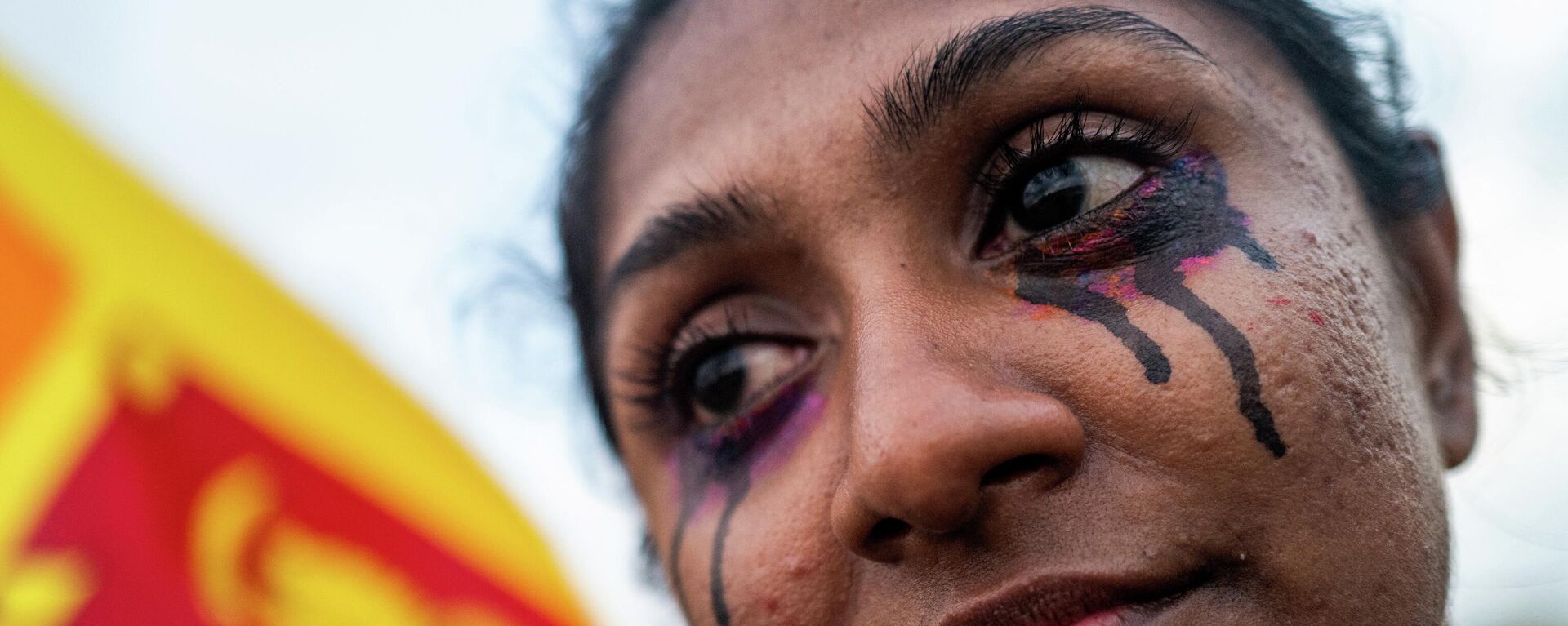https://sputnikglobe.com/20220425/debt-trap-is-a-myth-china-rejects-allegations-blaming-it-for-sri-lankan-economic-crisis-1095035046.html
'Debt Trap is a Myth': China Rejects Allegations Blaming It for Sri Lankan Economic Crisis
'Debt Trap is a Myth': China Rejects Allegations Blaming It for Sri Lankan Economic Crisis
Sputnik International
Sri Lanka’s economic woes compounded into a major political crisis this month, as protesters hit the streets due to runaway inflation caused by dwindling forex... 25.04.2022, Sputnik International
2022-04-25T15:54+0000
2022-04-25T15:54+0000
2022-04-25T15:54+0000
sri lanka
china
belt and road initiative
https://cdn1.img.sputnikglobe.com/img/07e6/04/19/1095040948_0:35:3519:2014_1920x0_80_0_0_b02cdd4d44ee3a601f83dc41215d8074.jpg
China's Ambassador to Sri Lanka Qi Zhenhong has rejected claims that the ongoing economic crisis in the country was fuelled in part by the debt it owed to Beijing.The Chinese diplomat also clarified that Colombo’s decision to lease out the Hambantota port on the country’s southern coast to Beijing's state-backed China Merchant Port Holdings company was taken to “raise” dollars to honour dues on international sovereign bonds. The port was handed over to the Chinese company in 2017.Qi stated that none of the proceeds from the lease pact were paid to Chinese banks.He went on to list connectivity and infrastructure projects as examples, including the Katunayake Expressway, Southern Expressway, Norochcholai Power Plant, and Colombo International City Project (CICT).Qi, however, admitted that it was “unrealistic” to expect all the projects to be “flawless”.Many Western experts and several leaders, including former US Vice President Mike Pence, have accused Beijing of “debt-trap diplomacy” involving extending concessional loans to low and middle-income nations and extracting political concessions in return. Pence’s comments were made in reference to the Hambantota port, which he described as a “forward military base” of Beijing.Even Indian Foreign Minister S. Jaishankar noted in February that countries, including those in India’s own neighbourhood, were being “saddled with large debts” because of “bad, unsustainable projects”. Most of the criticism against China's economic policies is centred on the Belt and Road Initiative (BRI), a series of overland and maritime connectivity and infrastructure projects being developed with Beijing's backing in more than 140 countries.China Involved in 'All-Out Efforts' to Support Sri LankaQi said that China was involved in “all-out efforts” to support Sri Lanka in the ongoing economic crisis facing the Indian Ocean nation.The Chinese ambassador said that Beijing had supplied Sri Lanka with 26 million doses of COVID vaccine as well as other medical supplies during the last two years of the COVID pandemic. He also noted that Beijing’s “financial support” to Sri Lanka during the COVID pandemic amounted to $2.8 billion.The diplomat further underlined that the financial institutions in China were “still working closely” on requests for loans and buyers’ credit from Sri Lanka.The formal request from the Sri Lankan side was made by President Gotabaya Rajapaksa during Chinese Foreign Minister Wang Yi's trip to Colombo in January of this year.In view of the economic crisis, the Sri Lankan government announced on 12 April that it would suspend all its external debt payments with immediate effect, a move that has the backing of the International Monetary Fund (IMF).A delegation from Sri Lanka led by new Finance Minister Ali Sabry held consultations with officials from the IMF and World Bank in Washington between 18 and 22 April. As per a statement from the IMF on 23 April, discussions were held on the “need for implementing a credible and coherent strategy to restore macroeconomic stability, and the importance of stronger social safety nets to mitigate the adverse impact of the current economic crisis on the poor and vulnerable”.“The IMF team welcomed the authorities’ plan to engage in a collaborative dialogue with their creditors”, it said.Before 12 April, Sri Lanka was obliged to pay a $1 billion repayment on sovereign bonds in July and debt repayments to the tune of $7 billion were due at the end of the year. In comparison, data from Sri Lanka's Central Bank pegged the current foreign exchange reserves at $2.3 billion, as reported by Reuters.Between 10 and 20 percent of Sri Lanka’s overall debt and sovereign bond payments are owed to China, its biggest lender.
https://sputnikglobe.com/20220420/economic-crisis-grips-sri-lanka-protests-amid-lack-of-food-fuel-and-medicine-1094906254.html
sri lanka
china
Sputnik International
feedback@sputniknews.com
+74956456601
MIA „Rosiya Segodnya“
2022
News
en_EN
Sputnik International
feedback@sputniknews.com
+74956456601
MIA „Rosiya Segodnya“
Sputnik International
feedback@sputniknews.com
+74956456601
MIA „Rosiya Segodnya“
sri lanka, china, belt and road initiative
sri lanka, china, belt and road initiative
'Debt Trap is a Myth': China Rejects Allegations Blaming It for Sri Lankan Economic Crisis
Sri Lanka’s economic woes compounded into a major political crisis this month, as protesters hit the streets due to runaway inflation caused by dwindling forex reserves and the nation's inability to pay for food and fuel imports. The whole Cabinet, except President Gotabaya Rajapaksa and his brother Prime Minister Mahinda Rajapaksa, has resigned.
China's Ambassador to Sri Lanka Qi Zhenhong has rejected claims that the ongoing economic crisis in the country was fuelled in part by the debt it owed to Beijing.
"Debt Trap is only a myth, created and hyped by some foreign media and politicians intentionally”, Qi said during a press conference in Colombo, as per the Chinese Embassy in Sri Lanka.
The Chinese diplomat also clarified that Colombo’s decision to lease out the Hambantota port on the country’s southern coast to Beijing's state-backed
China Merchant Port Holdings company was taken to “raise” dollars to honour dues on international sovereign bonds.
The port was handed over to the Chinese company in 2017.
Qi stated that none of the proceeds from the lease pact were paid to Chinese banks.
The Chinese envoy claimed at the presser that most of the hundreds of “joint projects” executed between Sri Lankan and Chinese companies have “generated economic and social benefits” for the people of the country.
He went on to list connectivity and infrastructure projects as examples, including the Katunayake Expressway, Southern Expressway, Norochcholai Power Plant, and Colombo International City Project (CICT).
Qi, however, admitted that it was “unrealistic” to expect all the projects to be “flawless”.
Many Western experts and several leaders, including former US Vice President Mike Pence, have accused Beijing of “
debt-trap diplomacy” involving extending concessional loans to low and middle-income nations and extracting political concessions in return.
Pence’s comments were made in reference to the Hambantota port, which he described as a “forward military base” of Beijing.
Even Indian Foreign Minister S. Jaishankar noted in February that countries, including those in India’s own neighbourhood, were being “saddled with large debts” because of “bad, unsustainable projects”.
Most of the criticism against China's economic policies is centred on the Belt and Road Initiative (BRI), a series of overland and maritime connectivity and infrastructure projects being developed with Beijing's backing in more than 140 countries.
China Involved in 'All-Out Efforts' to Support Sri Lanka
Qi said that China was involved in “all-out efforts” to support Sri Lanka in the ongoing economic crisis facing the Indian Ocean nation.
The Chinese ambassador said that Beijing had supplied Sri Lanka with 26 million doses of COVID vaccine as well as other medical supplies during the last two years of the COVID pandemic.
He also noted that Beijing’s “financial support” to Sri Lanka during the COVID pandemic amounted to $2.8 billion.
“Western developed countries, especially those who colonised Sri Lanka in history, should also come and help”, he urged.
The diplomat further underlined that the financial institutions in China were “still working closely” on requests for loans and buyers’ credit from Sri Lanka.
The formal request from the Sri Lankan side was made by President Gotabaya Rajapaksa during Chinese Foreign Minister Wang Yi's trip to Colombo in January of this year.
He also noted that the “economic crisis” and the “debt burden” of Sri Lanka has a “historical reason” and couldn’t be “solved overnight”.
In view of the economic crisis, the Sri Lankan government announced on 12 April that it would suspend all its external debt payments with immediate effect, a move that has the backing of the International Monetary Fund (IMF).
A delegation from Sri Lanka led by new Finance Minister Ali Sabry held consultations with officials from the IMF and World Bank in Washington between 18 and 22 April.
As per a
statement from the IMF on 23 April, discussions were held on the “need for implementing a credible and coherent strategy to restore macroeconomic stability, and the importance of stronger social safety nets to mitigate the adverse impact of the current economic crisis on the poor and vulnerable”.
“The IMF team welcomed the authorities’ plan to engage in a collaborative dialogue with their creditors”, it said.
Before 12 April, Sri Lanka was obliged to pay a $1 billion repayment on sovereign bonds in July and debt repayments to the tune of $7 billion were due at the end of the year.
In comparison, data from Sri Lanka's Central Bank pegged the current foreign exchange reserves at
$2.3 billion, as reported by Reuters.
Between 10 and 20 percent of Sri Lanka’s overall debt and sovereign bond payments are owed to China, its biggest lender.




